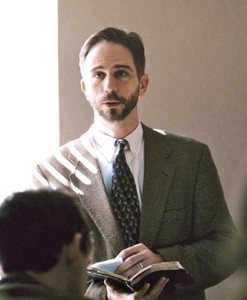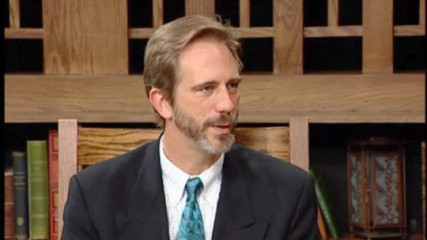David Gushee, University Professor of Christian Ethics and Director of the Center for Theology and Public Life at Mercer University, Atlanta & Macon, Georgia , shocked evangelicals by announcing he would now stand in solidarity with LGBT people. But what got him to this point?
Last October, he released Changing Our Mind; a compilation of essays that delineates how he arrived at his affirming stance. I met with Gushee to talk about his experience, the book, and his plans for working in the LGBT Christian conversation.
EC: What was the defining moment where your theology on LGBT people shifted?
DG: It’s been a process. In Changing our Mind I point to one particular experience. In January of 2013, I was at a high level evangelical up-and-coming leaders meeting. The conversation was not supposed to be about LGBT issues but you can’t get in any group without these issues coming up.
When the conversation shifted and people started talking about LGBT questions and evangelicals – I was briefly hopeful that maybe some of these 20-something young leaders would say something fresh instead of the usual clichés. But they just said the usual clichés. Something snapped that day for me.
I was like, “If this is the best we got, it’s not ok” and “Why do we keep picking at this scab over and over again without being willing to entertain any fresh thinking?” These attitudes – that I was not satisfied with – seemed to have been passed on to the next generation and we’re looking at another forty years of this. I guess I couldn’t take it anymore.
But that was just one moment in a series. The more I look back the more I see moments in the journey that I didn’t know were important then. I learned in 2008 that my youngest sister was a long repressed lesbian who had had serious psychological problems due to it. She came out and that was the first time this came home to me. The single more important experience was at my local church in Decatur, GA. First a trickle then a flood of LGBT Christians came into our church as couples, as individuals, and as families with children. They came into my Sunday school class, came into my life, and became friends.
EC: What do you have to say to those that will point to those experiences as influencing your judgment on scripture? Those claiming your experience make you bias on this issue.
DG: There is a strand of evangelical Christianity that says the only way an evangelical Christian thinks about an issue is opening the Bible and reading what you think it says in total abstraction from any human experience. It’s both without context in terms of the writing of the text and it’s also without context in terms of today.
In one of the chapters in Changing Our Mind, I talk about biblical counter examples like the Emmaus road experience. In that story, there are people walking down that road assuming a certain story after Jesus’ crucifixion. We thought Jesus was the messiah, ‘I guess He wasn’t because He was killed.’
Then they encounter Jesus and their eyes are opened and scripture looks entirely different. That’s when they believe. Also, we know the law rules out gentiles until God’s spirit moves and the gentiles come and Peter realizes he isn’t supposed to call anyone “profane” or “unclean.”
Those are examples of transformative encounters with people — in one case with Jesus himself and in others with gentiles — that transformed the reading of scripture. Certain ways of reading scripture are no longer plausible and other ways become imperative. These transformative encounters with people, especially with suffering people, are probably indispensable for scales falling from one’s eyes and being able to think about this issue in a different way. The problem is it shouldn’t take transformative experiences and there’s an awful lot of suffering going on while we’re waiting for everyone to have those transformative experiences.
EC: What do you think is the biggest obstacle Christianity has to face in order to embrace LGBT Christians?
DG: The biggest obstacle is a calcified reading of scripture that thinks the “LGBT issue” is only a sexual ethics issue and that issue is resolved by six passages. We need to successfully do a reframing to get people to see the relevance of the entire biblical witness related to human dignity, family wholeness, human wellbeing, and mental health. It’s a “human beings needing to be treated like other human beings” issue. Especially parents not accidentally or on purpose rejecting and irreparably harming their own children – it’s that kind of issue.
You have a received tradition of what Bible passages are relevant and how they’re to be interpreted. And then you have power structures that are invested in that tradition. So to challenge the tradition of biblical interpretation and the codes that follow from them is to challenge them.
EC: In your speech at The Reformation Project you continually said “gays and lesbians” or sexual minorities which isn’t inclusive language to transgender people. This left a lot of transgender Christians speculating on your beliefs on Trans identities. Can you clarify your stance on the Trans community?
DG: I’m not trying to exclude anybody. Sometimes I say “sexual and gender minority.” It gets a little cumbersome sometimes. But I think the issues of sexual and gender identities related but distinct. I actually think that to the extent that sexual orientations are over sexualized — that it’s mainly seen as a sexual issue — I don’t see why gender identity should be a problem at all.
EC: So you are theologically affirming of transgender individuals?
DG: Yes, absolutely. I think its complex. A different set of issues are raised. I don’t think it’s a moral issue if a person struggling with their gender identity and their gender assignment to do what they need to do to be at peace with their gender identity – I don’t’ see where that’s a moral issue. Nothing like the sexual morality questions.
EC: What is the message you want straight and LGBT Christians to receive from your book and your work?
DG: Christianity has a toxic fragment of tradition that needs to be abandoned like previous toxic fragments have been abandoned such as anti-Semitism. This toxic fragment of tradition is really hurting people, every day. It is hurting young people, children, kids coming out at the age of thirteen. It has to stop. A shift in biblical paradigm is not just mandatory, it’s doable. There are many people working for that shift and I hope to contribute to that.
I also want LGBT people to hear me say I’m sorry for the things that I wrote in the past. I didn’t get it. I hear from some people who have read some of the things I’ve said in the past on this. My writings on LGBT people were superficial and inadequate treatment. So I’m sorry, I want to stand in solidarity. I want the voices of those who are directly affected to be heard. As an ally, I hope to be heard by those who would dismiss those who are young, LGBT, or both. Hoping to provide some cover for more of those voices to be heard. I am dedicating myself to this cause — I’m all in on this.
This interview was edited for length and clarity. Follow my Twitter and Facebook for all things #FaithfullyLGBT.
Watch Gushee’s Keynote at The Reformation Project.






